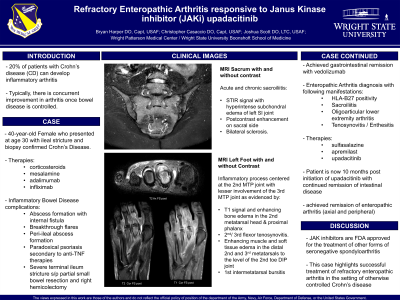Sunday Poster Session
Category: IBD
P1012 - Refractory Enteropathic Arthritis Responsive to Janus Kinase Inhibitor Upadacitinib
Sunday, October 27, 2024
3:30 PM - 7:00 PM ET
Location: Exhibit Hall E

Has Audio
- BH
Bryan Harper, DO
Wright State University Boonshoft School of Medicine, United States Air Force
Dayton, OH
Presenting Author(s)
Bryan Harper, DO1, Christopher Casaccio, DO2, Joshua Scott, DO3
1Wright State University Boonshoft School of Medicine, United States Air Force, Dayton, OH; 2Wright-Patterson Medical Center, Wright-Patterson AFB, OH; 3Wright Patterson Medical Center, Wright-Patterson AFB, OH
Introduction: Enteropathic arthritis is an extraintestinal manifestation of inflammatory bowel disease. As many as 20% of patients with Crohn’s disease (CD) can develop inflammatory arthritis over their lifetime. Typically, there is improvement in arthritis once the underlying bowel disease is adequately controlled. The following case describes a patient with difficult to treat Crohn’s disease who developed refractory arthritis despite control of CD with vedolizumab, requiring change in therapy.
Case Description/Methods: Patient is a 40-year-old female diagnosed with CD at the age of 30 via colonoscopy revealing a stricture of the ileum with confirmatory biopsy. She had a difficult treatment course failing initial corticosteroid management with development of abscess and internal fistula requiring abscess drainage. Adalimumab treatment was ineffective with breakthrough flares and peri-ileal abscess formation resulting in transition to infliximab. Infliximab was ineffective and complicated by paradoxical psoriasis, resulting in eventual partial bowel resection and right hemicolectomy for severe terminal ileum stricture 7 years after diagnosis. In the post operative interval, she was found to have HLA-B27 positive unilateral sacroiliitis, as an initial presentation of enteropathic arthropathy with symptoms refractory to non-steroidal anti-inflammatory therapy. 12 months later her CD had achieved remission of intestinal disease on vedolizumab. However, she experienced progressive axial arthritis with magnetic resonance imaging (MRI) demonstrating bilateral sacroiliitis. Patient’s enteropathic arthritis was further complicated by oligoarticular lower extremity predominant arthritis and tenosynovitis as demonstrated on MRI and later confirmed with synovial biopsy. In consultation with rheumatology, due to her progressive arthritis in setting of well controlled Crohn’s disease she was transitioned to upadacitinib for anticipated control of both her CD and enteropathic arthritis. After 3 months of upadacitinib initiation, the patient maintained control of her intestinal CD and achieved remission of enteropathic arthritis, which has been sustained through 10 months of treatment.
Discussion: JAKi are commonly used in the treatment of other forms of spondyloarthritis, such as psoriatic arthritis and ankylosing spondylitis. This case highlights successful treatment of refractory enteropathic arthritis in the setting of CD and possible therapy to consider in failure of standard therapies.
Disclosures:
Bryan Harper, DO1, Christopher Casaccio, DO2, Joshua Scott, DO3. P1012 - Refractory Enteropathic Arthritis Responsive to Janus Kinase Inhibitor Upadacitinib, ACG 2024 Annual Scientific Meeting Abstracts. Philadelphia, PA: American College of Gastroenterology.
1Wright State University Boonshoft School of Medicine, United States Air Force, Dayton, OH; 2Wright-Patterson Medical Center, Wright-Patterson AFB, OH; 3Wright Patterson Medical Center, Wright-Patterson AFB, OH
Introduction: Enteropathic arthritis is an extraintestinal manifestation of inflammatory bowel disease. As many as 20% of patients with Crohn’s disease (CD) can develop inflammatory arthritis over their lifetime. Typically, there is improvement in arthritis once the underlying bowel disease is adequately controlled. The following case describes a patient with difficult to treat Crohn’s disease who developed refractory arthritis despite control of CD with vedolizumab, requiring change in therapy.
Case Description/Methods: Patient is a 40-year-old female diagnosed with CD at the age of 30 via colonoscopy revealing a stricture of the ileum with confirmatory biopsy. She had a difficult treatment course failing initial corticosteroid management with development of abscess and internal fistula requiring abscess drainage. Adalimumab treatment was ineffective with breakthrough flares and peri-ileal abscess formation resulting in transition to infliximab. Infliximab was ineffective and complicated by paradoxical psoriasis, resulting in eventual partial bowel resection and right hemicolectomy for severe terminal ileum stricture 7 years after diagnosis. In the post operative interval, she was found to have HLA-B27 positive unilateral sacroiliitis, as an initial presentation of enteropathic arthropathy with symptoms refractory to non-steroidal anti-inflammatory therapy. 12 months later her CD had achieved remission of intestinal disease on vedolizumab. However, she experienced progressive axial arthritis with magnetic resonance imaging (MRI) demonstrating bilateral sacroiliitis. Patient’s enteropathic arthritis was further complicated by oligoarticular lower extremity predominant arthritis and tenosynovitis as demonstrated on MRI and later confirmed with synovial biopsy. In consultation with rheumatology, due to her progressive arthritis in setting of well controlled Crohn’s disease she was transitioned to upadacitinib for anticipated control of both her CD and enteropathic arthritis. After 3 months of upadacitinib initiation, the patient maintained control of her intestinal CD and achieved remission of enteropathic arthritis, which has been sustained through 10 months of treatment.
Discussion: JAKi are commonly used in the treatment of other forms of spondyloarthritis, such as psoriatic arthritis and ankylosing spondylitis. This case highlights successful treatment of refractory enteropathic arthritis in the setting of CD and possible therapy to consider in failure of standard therapies.
Disclosures:
Bryan Harper indicated no relevant financial relationships.
Christopher Casaccio indicated no relevant financial relationships.
Joshua Scott indicated no relevant financial relationships.
Bryan Harper, DO1, Christopher Casaccio, DO2, Joshua Scott, DO3. P1012 - Refractory Enteropathic Arthritis Responsive to Janus Kinase Inhibitor Upadacitinib, ACG 2024 Annual Scientific Meeting Abstracts. Philadelphia, PA: American College of Gastroenterology.
